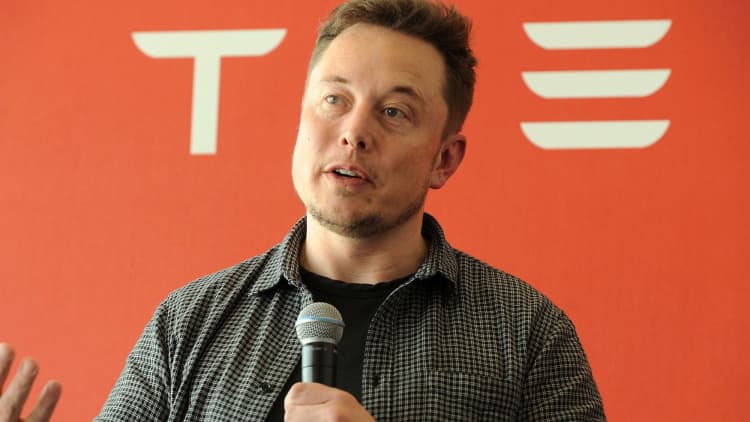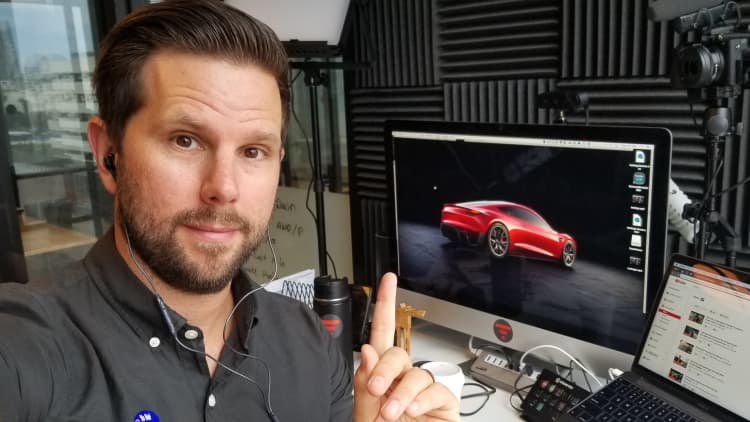Elon Musk has made no secret of his ambitions to create a fleet of self-driving electric Tesla "robotaxis" that can one day ferry customers from place to place without a driver. But, now the billionaire Tesla CEO is also warning potential Tesla owners that his company's electric vehicles will likely become much more expensive once his Tesla robotaxi dream becomes a reality.
Musk indicated in a series of Twitter posts on Sunday that consumers may have a limited amount of time to buy a Tesla at the electric cars' current prices — the average sale price of Tesla's Model 3, S and X vehicles was roughly $66,800 in the final quarter of 2018, according to research firm CFRA — because the ability to create a fleet of self-driving taxis would make Tesla's vehicles far more valuable than they are now.
A Twitter follower asked Musk on Sunday night if "consumers have limited time left to buy a Tesla car" based on the fact that supply and demand would likely necessitate major price hikes by Tesla if the company is, in fact, able to establish a successful robotaxi service. The billionaire responded, "Yes."
Musk then elaborated on his response, clarifying that Tesla will continue selling cars to consumers, even if the company starts building self-driving electric cars for a Tesla ride-hailing service — but, the prices that consumers will pay in that scenario would be significantly higher than they are now.
A Tesla spokesperson told CNBC Make It the company would not elaborate beyond Musk's tweets on any potential future consumer price hikes.
So, why would the cost of Teslas increase if the company launches its own fleet of self-driving taxis? Musk explains on Twitter that "a fully autonomous car that can function as a robotaxi is several times more valuable than a non-autonomous car." In other words, rather than selling a Tesla for an upfront price of tens of thousands of dollars, Teslas could instead be used as robotaxis that could potentially continue earning money for the company for years as part of a ride-hailing service.

Earlier this year, Musk told investors that full self-driving capabilities, and the possibility of a Tesla ride-hailing network, could eventually make Tesla worth $500 billion (the company's current market value is just over $40 billion). Some critics of the company scoffed at Musk's valuation prediction, while even an analyst who believes Tesla stock is currently undervalued admitted that Musk is prone to setting "extremely aggressive goals," Ark analyst Tasha Keeney told CNBC's "Squawk Box" in May.
Musk has been teasing the potential of self-driving electric cars for several years as the CEO of Tesla, but it remains to be seen when Tesla, or any other company, will actually have the ability to sell fully autonomous vehicles that can steer and navigate on any road without the need for a driver to assist or supervise the ride.
Tesla currently claims that all of the company's vehicles are already outfitted with the hardware necessary for full self-driving, and that Tesla vehicles only need software updates to reach full autonomy. At the moment, Tesla's autopilot function still requires a driver to remain attentive and to be ready to take over operation of their vehicle at any given time. However, Musk predicted earlier this year that Tesla will be able to make cars with no steering wheels or pedals — which would have no need for a human driver at all — within two years, though some experts are still skeptical that Tesla can make that timeline work.
Of course, Tesla and other companies developing self-driving vehicle technology will also need the approval of federal regulators before making that technology available to consumers for use on public roads. And, any company would also need approvals from regulators to operate a ride-hailing network of autonomous cars.
Still, Musk claimed in April that he is "very confident" Tesla will have 1 million robotaxis on the road by next year. While Musk has been known to fail to meet his own deadlines for Tesla on several occasions, he added: "Sometimes I am not on time, but I get it done." (That being said, Tesla has had a better track record with recent production deadlines. Tesla set a company record by delivering 95,200 cars in the most recent fiscal quarter, backing up Musk's promise to investors of a record-breaking quarter.)
A number of auto companies are also developing their own self-driving car technology, while Tesla is also competing with companies like Uber and Lyft that are working on adding self-driving taxis to their own ride-sharing platforms. (Lyft has even partnered with Google-parent Alphabet's Waymo on self-driving tech while recently making some self-driving rides available to customers in a small area near Phoenix, Arizona.) Uber CEO Dara Khosrowshahi said on CNBC's "Squawk Box" in May that he's skeptical of Musk's promise of self-driving robotaxis in 2020, with the Uber CEO predicting "it will be quite a few years beyond" before driverless robotaxis are on the road.
Don't Miss:
These Chinese hackers tricked Tesla's Autopilot into suddenly switching lanes
Tesla's Model 3 ranked 'most satisfying' car, more than Porsche or Corvette
Like this story? Subscribe to CNBC Make It on YouTube!


